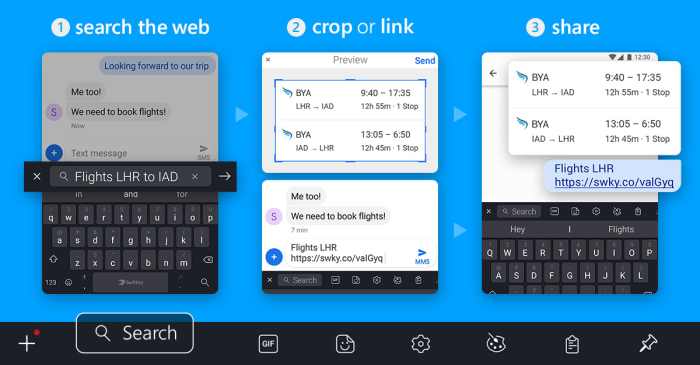SwiftKey Google search engine option: Ever wondered how your keyboard secretly fuels your Google searches? This isn’t just about typing; it’s about the seamless blend of predictive text, autocorrect, and the power of Google’s search engine all within your SwiftKey experience. We’re diving deep into this integration, exploring its features, benefits, and even some potential privacy concerns. Get ready to unlock the hidden secrets of your keyboard’s smart search capabilities.
We’ll unpack how SwiftKey uses Google’s search prowess to anticipate your next word, correct your typos with laser precision, and generally make typing faster and easier. We’ll also examine the technical architecture, compare it to other search engine integrations, and discuss user preferences. Think of this as a complete guide to maximizing your SwiftKey-Google synergy.
SwiftKey’s Integration with Search Engines: Swiftkey Google Search Engine Option
SwiftKey’s seamless integration with various search engines elevates the mobile typing experience beyond mere word prediction. It transforms the keyboard into a powerful gateway to information, directly impacting how users search and access online content. This integration isn’t just about convenience; it’s about efficiency and a streamlined information retrieval process.
SwiftKey’s integration with search engines is multifaceted, offering users diverse ways to find what they need without leaving the keyboard. The core functionality allows users to directly initiate searches from the prediction bar, eliminating the need to open a separate browser or search app. This is achieved through a sophisticated interplay of predictive text algorithms, contextual understanding, and direct API connections to various search engines.
Technical Architecture of SwiftKey’s Search Engine Integration
The technical architecture behind SwiftKey’s search engine integration is complex but can be broadly understood as a layered system. First, SwiftKey’s predictive text engine analyzes user input, anticipating the intended search query. This involves natural language processing (NLP) techniques to interpret context, intent, and even potential ambiguities. Once a likely search query is identified, SwiftKey’s backend interacts with the chosen search engine’s API using secure protocols. The search engine then processes the query, returning relevant results. Finally, SwiftKey presents these results in a user-friendly format within the prediction bar, often with snippets of information and links to the full results. The entire process is designed to be nearly instantaneous, ensuring a smooth and responsive user experience. This efficient architecture requires a robust infrastructure capable of handling millions of simultaneous requests.
User Experience Comparison Across Different Search Engines, Swiftkey google search engine option
The user experience varies slightly depending on the integrated search engine. While the core functionality remains consistent – launching searches directly from the keyboard – subtle differences exist in the presentation of results and the overall speed. For instance, Google’s integration might prioritize visually rich snippets, whereas another search engine may focus on a more text-based summary. Speed can also be impacted by factors like network connectivity and the search engine’s server load. However, overall, the experience aims for seamlessness and efficiency regardless of the chosen engine.
Search Engine Integration Comparison
The following table summarizes the strengths and weaknesses of different search engine integrations with SwiftKey (note: This is a hypothetical comparison for illustrative purposes, as SwiftKey’s exact integration details with specific search engines are not publicly available in detail).
| Search Engine | Speed | Accuracy | Feature Set |
|---|---|---|---|
| Excellent; generally very fast results | High; leverages Google’s extensive knowledge graph | Rich snippets, image results, knowledge panel integration | |
| Bing | Good; comparable to Google in most cases | High; strong in specific areas like image search | Visual search, news integration, rewards program integration (potential) |
| DuckDuckGo | Good; may vary slightly due to its privacy-focused approach | High; focuses on privacy-respecting results | Emphasis on privacy, limited personalized results |
| Ecosia | Good; similar speed to other engines | High; utilizes Bing’s search index | Focus on environmental sustainability, tree planting initiatives |
Privacy Implications of SwiftKey’s Search Engine Integration
SwiftKey’s integration with various search engines offers convenience, but it also raises important questions about your data privacy. Understanding how these integrations handle your information is crucial to maintaining control over your digital footprint. This section delves into the privacy policies of different search engines and the potential security risks associated with their use within the SwiftKey keyboard.
Data Privacy Policies of Integrated Search Engines
Each search engine integrated with SwiftKey operates under its own distinct privacy policy. Google, for instance, collects data about your searches to personalize your experience and target advertising. Bing, another popular option, also collects search data, though its data collection practices might differ slightly from Google’s in terms of the types of data collected and how it’s used. Understanding these nuances is vital. For example, Google’s policy might be more extensive regarding data retention periods or the use of your search history for targeted advertising compared to Bing’s policy. Before choosing a search engine within SwiftKey, carefully review each provider’s privacy policy to understand the extent of data collection and its intended use. This proactive approach empowers you to make informed decisions aligned with your privacy preferences.
Comparison of Data Collection Practices
Google and Bing, the most common integrated search engines, both collect data related to your searches. This data typically includes search terms, your IP address, and potentially your location. However, the level of detail collected and the ways this data is utilized vary. Google, known for its comprehensive data collection, uses this information to personalize search results, tailor advertising, and improve its services. Bing, while also collecting search data, may have a less extensive data retention policy or a different approach to targeted advertising. Other less common search engines integrated with SwiftKey may have even more varied practices, necessitating careful review of their individual policies. The key takeaway is that there is no one-size-fits-all answer; each search engine’s approach differs.
Potential Security Risks
Using integrated search engines within SwiftKey introduces potential security risks, particularly if you use public Wi-Fi or unsecured networks. Your search queries, which can reveal sensitive personal information, are transmitted to the search engine’s servers. If the network connection isn’t secure, this data could be intercepted by malicious actors. Furthermore, vulnerabilities within SwiftKey itself or the search engine’s infrastructure could potentially expose your search data to unauthorized access. Always prioritize using secure networks (like your home Wi-Fi) when using SwiftKey’s search functionality.
Best Practices for Maintaining Privacy
Maintaining privacy while using SwiftKey with integrated search engines requires proactive steps.
- Review Privacy Policies: Carefully read the privacy policies of each search engine before using it within SwiftKey.
- Use Secure Networks: Avoid using SwiftKey’s search functionality on public Wi-Fi unless it’s secured with a VPN.
- Clear Search History: Regularly clear your search history both within SwiftKey and on the search engine itself.
- Use a VPN: Consider using a Virtual Private Network (VPN) to encrypt your internet traffic and mask your IP address.
- Enable Two-Factor Authentication: Where available, enable two-factor authentication for your search engine account to enhance security.
- Be Mindful of Search Queries: Avoid searching for sensitive personal information, such as passwords or financial details.
So, is the SwiftKey Google search engine option a game-changer? Absolutely. From the lightning-fast speed and accuracy to the enhanced predictive text, this integration significantly elevates the typing experience. While privacy considerations are always important, understanding the data collection practices and implementing best practices ensures a smooth, efficient, and secure interaction. Ultimately, choosing Google within SwiftKey is a personalized decision based on your priorities – but now you’re armed with the knowledge to make an informed choice.
 Blockchain Essentials Berita Teknologi Terbaru
Blockchain Essentials Berita Teknologi Terbaru

